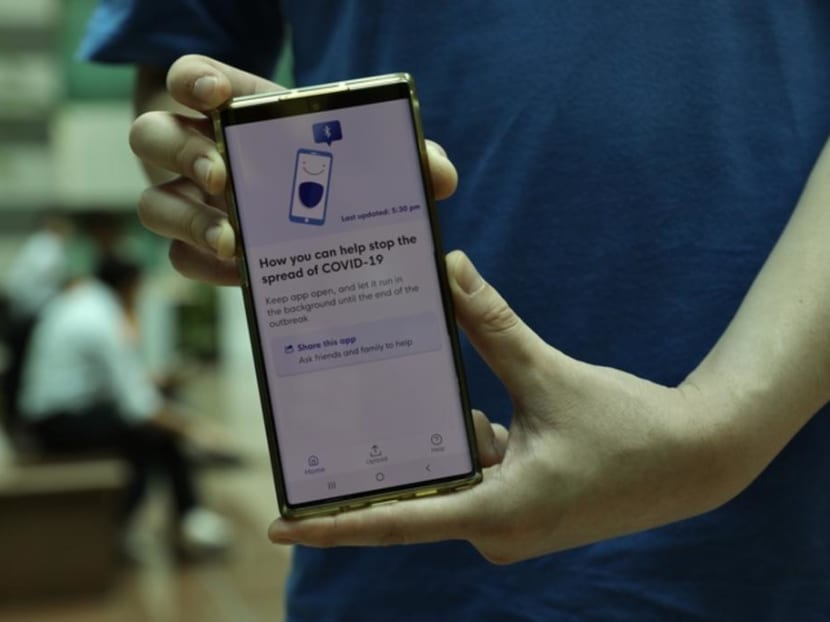Covid-19: Governance expert says TraceTogether should be mandatory, but warns of potential ‘slippery slope’ of greater surveillance
SINGAPORE — As Covid-19 infections here continue to climb by the hundreds daily, the Government should mandate the use of the TraceTogether contact-tracing mobile application, a governance expert said on Wednesday (May 13).

Mr Christopher Gee from the Institute of Policy Studies felt that the TraceTogether contact-tracing app should be mandatory as Covid-19 cases continue to rise rapidly in Singapore.
SINGAPORE — As Covid-19 infections here continue to climb by the hundreds daily, the Government should mandate the use of the TraceTogether contact-tracing mobile application, a governance expert said on Wednesday (May 13).
Mr Christopher Gee, who heads the governance and economy department at the Institute of Policy Studies (IPS), acknowledged that this might, however, lead to a “slippery slope” of greater surveillance of citizens’ personal data by the Government or malicious actors who may gain access to the data collected.
He made this point at an hour-long IPS online seminar on the use of personal data for public good hosted via Facebook Live.
Also on the panel — moderated by IPS senior research fellow Carol Soon — were Ms Teo Yi-Ling, a senior fellow at the S Rajaratnam School of International Studies, and Associate Professor Jung Won Sonn from the Faculty of the Built Environment at the University College London.
Referring to a scenario where the use of TraceTogether was mandatory, Mr Gee said: “Given the speed of things happening, what we do need is a law and for the Government to make it mandatory, as (with) the situation with the face masks and having to wear them in public.”
Still, he told TODAY after the seminar that this might lead to a slippery slope that could allow people’s data to be surveilled by the Government and potentially malicious actors who may “breach the security put around the data collected”.
“I believe that we are already some way down this slope.
“We already share so much of our private data, not just with governments, but also with for-profit entities like Big Technology,” he said.
Ms Teo disagreed that the app’s use should be compulsory, saying that this would not go down well with citizens and should be done only if the pandemic “gets out of hand”.
This could happen if transmission rates in the community were to suddenly double from the present average after the circuit breaker ends on June 1, for instance, she told TODAY via email after the seminar.
The TraceTogether app works by exchanging Bluetooth signals between nearby mobile phones that have the app installed, estimating the distance between users and how much time they spent in contact.
Based on the TraceTogether website, only 25 per cent of the population had downloaded the app since its launch on March 20, far below the 75 per cent needed for it to be effective.
Privacy concerns as well as how it drains the batteries of iPhones have been cited as reasons for its low uptake. Similar apps launched in countries such as Australia, the United Kingdom and India have come under fire after concerns over privacy invasion.
WHY THE RELUCTANCE TO DOWNLOAD APP
Ms Teo flagged several reasons why people have been reluctant to download the TraceTogether app.
First, there are concerns over a loss of privacy. People have fears about whether the app could access their locations and what it might disclose of their movements, she said.
She added that while people are usually willing to hand over personal information to private companies as this may come with benefits, they were reluctant to do the same with the Government as it was less clear what they would receive in return.
Then there are concerns over data security breaches, especially after the SingHealth cyber attack two years ago in which hackers stole the personal information of 1.5 million patients, including that of Prime Minister Lee Hsien Loong.
The TraceTogether app was also not appealing on a functional level, Ms Teo said, with some users reporting that leaving the Bluetooth function on led to the phone’s battery depleting quickly.
“I have also heard people say that because they are all not really out and about because of the circuit breaker, there is no point using the app (now),” said Ms Teo.
Other experts had previously suggested to TODAY that TraceTogether’s contact-tracing functions could be integrated with apps that Singaporeans already use, or merged with the SafeEntry system that is already in place at shopping malls.
SafeEntry is a system that requires users to scan a QR (quick response) code to check in with their personal details when entering a place and to check out upon leaving.
Mr Gee proposed that to increase its adoption rate, a digital citizens’ charter should be formed, laying out guiding principles on what comprises private or public data.
Speaking to TODAY after the seminar, Mr Gee said that the charter should be a citizen-driven initiative. For instance, a citizen-led body, akin to the Public Transport Council, could lead an engagement process among citizens to devise the guidelines.
HOW PRIVATE DATA CAN CONTRIBUTE TO PUBLIC GOOD
Despite the debate over privacy concerns, private data can contribute to the public good, especially since public health crises are likely to recur in the future, the experts said.
Mr Gee cited the example of how private information on an individual’s location and movement is already being used for the good of the community, including to ease traffic congestion.
Such aggregation of personal data, he said, could help tackle other issues such as environmental degradation and disease transmission in dense cities such as Singapore.
“We can already see examples of this sharing of private data benefiting the public at large and individuals who contribute their personal data,” said Mr Gee.
“They all gained from improved services as a result.”








